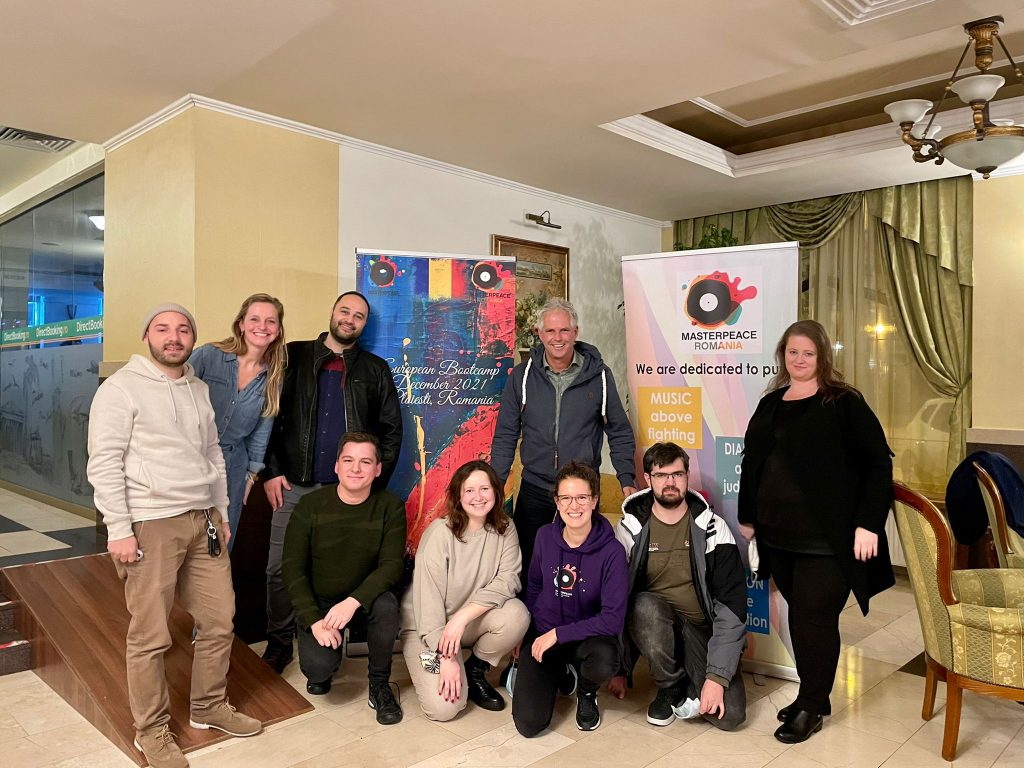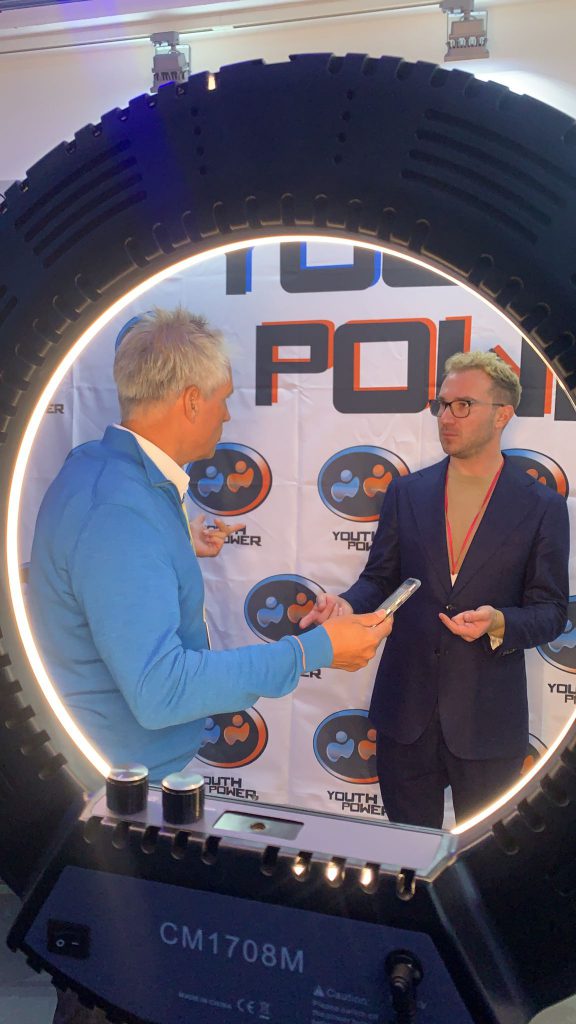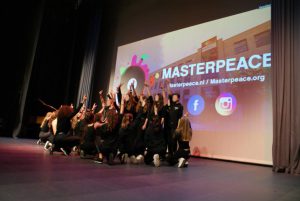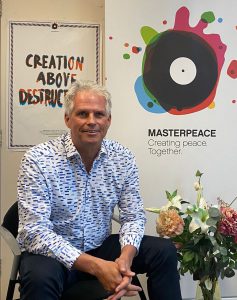I like to identify MasterPeace as a foundation that acts like an innovative social enterprise. A brand that you want to be part of. That is what I truly believe in.
Aart Bos

To start with a simple question: Which colour and animal describes you best?
I think the colour green would describe me best. Green is of course the colour of nature, which reminds me of my trails in Africa. Especially regarding MasterPeace, I always reflect on how nature is organized. Nature comes in waves; spring, summer, autumn and winter. To me these are guiding principles for innovation, sustainability and letting go. When thinking of an animal, I’d have to go with the dolphin, because dolphins are both strong and gentle at the same time. They are likable, touchable and kind creatures who can jump out of the water really high, and swim at a really high speed for hours on end. Once when I was sailing in Croatia a bunch of dolphins just kept swimming next to our boat, keeping us company, for a really big part of the day. This gentleness, speed and power really appeal to me.
 You are the leader of the global MasterPeace movement, which has young club leaders all over the world. How do you think that these young leaders see you?
You are the leader of the global MasterPeace movement, which has young club leaders all over the world. How do you think that these young leaders see you?
I think that they see me as a mentor. As this experienced grandfather who always says that he has the best job in the world. Everybody knows that I always say that. But I continue saying this because I do not only think that I have the best job in the world, but all of us -together- have the best job in the world with MasterPeace.
What have you learned not to do as a leader during your time at MasterPeace?
This will be a complex answer. First of all, a leader should be a strong visionary and always be leading from behind. This is the servant leadership concept. Not like a manager who micromanages every step that is taken. As a leader, I think that what you do not want to do is push too much, but trust in the fact that people will do their best as much as they can, and ask for help when they need it. On the other hand, a good leader also knows when it is time to inspire them to exceed expectations, and see when they need some nudging.
 MasterPeace is celebrating its tenth birthday. Can you give us a brief summary of the achievements of MasterPeace in the last ten years?
MasterPeace is celebrating its tenth birthday. Can you give us a brief summary of the achievements of MasterPeace in the last ten years?
For me, I’d say that there have been four really big achievements that MasterPeace has made in the last years. First of all of course the vibrant network that we have become. There are 58 different MasterPeace clubs globally, all very much different and still part of the same collective, like different kinds of fruit making one colourful fruit basket. Second I am really proud of the capacity and resilience of our local changemakers, who all together perform about three to four hundred projects a year. That has a massive impact on their local communities . Another achievement that really makes me proud is the personal growth that I see when looking at our local club leaders. I see change and growth in all our changemakers. A local club leader once told me that he wouldn’t be the same person he is today without MasterPeace. I think that these personal stories are some of our best achievements. Lastly, I think that our attractiveness as a partner is a really great achievement. MasterPeace has come so far, where at first we were scraping day by day, having to ask favours from our personal networks all the time, we are now being asked by different partners to be part of their sounding boards and cooperate with them. This has also been a big change in the last two years.
You say that there has been a big change in the last two years. Why did this switch happen two years ago?
MasterPeace Foundation and our coreteam has had its share of financial struggles over time. Our unique business model is that we license local changemakers and their organisation without any financial contribution. So the coreteam has to fund their own costs. Three years ago we were scraping by, spending as much time to find funds for next month’s salary, as on actual projects. That resulted in the fact that we could not really focus on long term projects. But in 2018, we won a significant tender by the Dutch ministry of foreign affairs. That funding brought a lot of peace of mind and a lot of space in our agendas. We could hire more people for the core team, we could look beyond the following three months in our planning, and we could do a lot more strategic planning. We grew from only three people in the MasterPeace core team, to eight employees and three interns. Our services to the MP clubs grew in quality and quantity. So this first cross EU program enabled us to really grow and establish the MasterPeace that we envisioned. That, in turn, has given us the opportunity to apply for even more cross country projects , giving us the financial room to have bigger projects.
Apart from looking back, we also would like to discuss the future. Where do you think MasterPeace will be in 2030?

I hope that I will still be visiting different countries and meeting different leaders, and coaching the core team in one way or another. I envision MasterPeace as the guest of honour during the prestigious World Economic Forum and harnessing the power of music, art and play as a unifying momentum in a polarised world. I see us as part of a movement that is ten times bigger than we are now, but MasterPeace will only be a part of that. We don’t have to grow tenfold ourselves. I envision a large network of organizations that acts as one, based on shared values. Like our current partners who interact and work together with us basically like colleagues. They might have a different payroll, but we still belong to the same group. I believe all these kinds of organizations will be more fluid in ten years. We will all co-create and work together. This is the structure that NGO’s and CSO’s really need to develop and innovate. And MasterPeace is already the best practice example in this field. I actually do not really like the term NGO, I like to identify MasterPeace as a foundation that acts like an innovative social enterprise. A brand that you want to be part of. That is what I truly believe in. MasterPeace is placed right in the gap between institutes and society, as a kind of broker. So in ten years, MasterPeace will be an inspirational example, a network of changemakers, and a broker for decision makers.
You always say that you have the best job in the world. But where do you draw your inspiration to keep going every day, even in darker times?
From our young leaders, from our local clubs. ‘Darker times’ are always relative to the situation of course. I am a very lucky guy to have been born in Waddinxveen, the Netherlands. When I think about that, I would be ashamed to even think about complaining about anything. I have been born in one of the best situations imaginable. And I hear on a daily basis so many stories on how tough life is, the pressure they face doing community work, but they also teach me what resilience means. The global north can learn so much from global south! They have found a purpose in helping their communities and countries. I too found purpose in MasterPeace, to use my talents to make the world a better place, as much as I can. I think that it is my responsibility to do so. My mentor used to say “I want to contribute, not to extract.” Which means that in the end, I want to make sure that I contribute more to society than I take from it. So every week I reflect, and ask myself what I contributed, and how much energy it has cost. I always try to check with myself if I can keep up the work, so as to not overwork, and whether my work actually contributes to something that I believe in.
You were a businessman before you worked for MasterPeace. How did you end up as CEO of this global movement?
 First of all: I hate the term ‘CEO’. Because I am not an executive officer of local ownership. That is a giant contradiction. I see the model more as an upside-down pyramid, with me at the bottom, and the local clubs at the top. I’d call myself a global leader, but not a CEO. And I think that NGO’s, by definition, should not have a CEO, because it implies so much in terms of power-structures, even though most NGO’s will be against these very same structures, because eventually it is the local people for which we do all our work, and not the other way around.
First of all: I hate the term ‘CEO’. Because I am not an executive officer of local ownership. That is a giant contradiction. I see the model more as an upside-down pyramid, with me at the bottom, and the local clubs at the top. I’d call myself a global leader, but not a CEO. And I think that NGO’s, by definition, should not have a CEO, because it implies so much in terms of power-structures, even though most NGO’s will be against these very same structures, because eventually it is the local people for which we do all our work, and not the other way around.
So I joined MasterPeace in 2012, and it is an interesting story how I actually came to join. Marcella (my wife) was doing a pro-bono project in Washington, with a group that was full of great ideas, but without the ‘punch’ to actually go through with them. They were all talk and no action. She felt somewhat let down because of this, and started searching for an organization that was better at actually making true what they were saying. She found Dance4Life, which was founded by the same person who co-founded MasterPeace, Ilco van der Linde. Marcella figured that Dance4Life would be a good “best practice” that could be learned from and used in the community she worked for in Washington, so she called Ilco and asked for a meeting. This led to her flying to Spain, where Ilco lived, for a weekend. Ilco is a really inspiring person, so he quickly convinced us to contribute to MasterPeace. Since I was a businessman, I could become a sponser. We had more and more contact and eventually we became friends. At that same time, my old job was not scratching the itch that I had wanted to contribute more to society. Not as a single pro-bono project, but a fulltime job. This resulted in me announcing my resignation from the company where I worked, and looking for work to do after my contract would expire. I had multiple job offers, of which MasterPeace was one.
Marcella and I decided to go on a holiday to Bali and make a final decision there. And it was there, in the swimming pool, that we started listing all the pros and cons of the different job offers. And when we discussed MasterPeace, I could just feel my body physically relaxing It was definitely the right fit. It ticked all the right boxes: societal impact, traveling, learning from other cultures, working with young people. My children were all grown up and out of the house, there was no issue with having a smaller salary than I used to; I could only see good reasons to take the job. I immediately called Ilco to tell him that I was in. He told me that MasterPeace did not have that much money, so I declared that I did not care: I would take whatever he was earning a month, minus €500, without me even knowing his salary. The worst thing that could happen was that we had to sell our home and start renting an apartment, so there was no real risk at all. So I quickly joined to run the Dutch office, MasterPeace Europe and the finances. A few years later I took over as global leader.
How do you think that you experience in the business world has contributed to MasterPeace?
My personal qualities have always been connecting and creating networks, and business innovation. That is exactly what I am doing now as global leader, so my job is practically the same in that regard. In business, I was always a bit unique. Where normally people would talk about PDP’s, or personal development plans, I have always encouraged PPP’s, what I like to call ‘personal passion plans.’ I am only interested in what your passion is, and how you can develop that passion. Because when you are really passionate, you never say that you ‘have’ to go to work, or that you really want to stop working at the end of the afternoon. This is also why I have never registered holidays for my team , since when people are truly passionate about their work, they will also be honest about that. They themselves know best when they should and should not work. Sometimes you have to work a Sunday night due to a deadline the day after that. And sometimes you can afford to take an extra day off. I always like to say: nothing under control, but everything is OK. I trust the people that I work with.
So I am using my experience as a businessman for a way more rewarding and exciting topic. Just look at the working day I had yesterday: Starting with a call with Asia, a call with Lebanon, a call with Bogotá and the founder of the war childhood museum in Sarajevo, meeting a someone in the office who is a friend of a friend who just moved to the Netherlands as an expat form South Africa, and asking if she can do some volunteering work for MasterPeace. Just because she wants to contribute. Isn’t that amazing? It is indeed the best job in the world. I really enjoy watching people grow, and helping them achieve their potential. All because I just trust that people genuinely want to contribute if they can. Just as with education I think that what should be done is not to shape people into what you want them to be, but to let their own talents and inspiration grow. Beyond the bureaucracies and to-do’s.
Many people around the world are proud to be associated and connected to MasterPeace. What is your message to all those young leaders, partners and friends?
We celebrate because of you. Thanks to you. We are proud changemakers. So we are celebrating your work. Not mine.
Do not underestimate the power you have. There is more power in people than the people in power. There is so much power in each and every one of us. And that power also comes with a responsibility.
I have a message for everybody who is trying to find their place in the world: You do not need to over-perform. You do not need to prove yourself over and over again. You do not need to meet all the expectations that people have set on you. You are beautiful and amazing as you are now. That is the most powerful and the most true message. And sometimes it is hard. The world is complex and sometimes hours are dark. But we cannot afford to be too negative about others, and we cannot afford to be too negative about ourselves. Because it is too complex and too urgent to just wait for the President or the UN to solve our problems. Eventually, it is just you and me.
